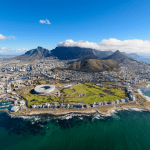Fans whose teams have dropped out of the World Cup are finding there is plenty to keep them in South Africa even after their soccer dreams die.
From cuddling baby lions to diving with sharks, South Africa has a myriad of attractions and is eager for football visitors to sample the goods in the hopes that their enthusiastic tales when they get home will help boost tourism.
Chris Dorsey and his friends began their three-week tour in Johannesburg, South Africa’s city of gold, before viewing wildlife in Kruger, the country’s top game park.
“We saw leopards, that was incredible…Would we have come to South Africa if it wasn’t for the World Cup? Maybe, one day, but this definitely convinced us to come explore now,” the American, from Austin, Texas, told Reuters.
South Africa spent about 40 billion Rand on the one-month event, hoping to attract millions more tourists in the next few years and reverse negative advance reporting that painted it only as ridden with violent crime.
“You always hear about how dangerous this country is, but I’ve had no problems at all,” said Tom Flynn, a 19-year-old England fan, before jumping 216 metres (yards) from the world’s tallest bridge bungee jump outside Plettenberg Bay, clad in an England wig and a flowery dress.
Thieves have targeted players and journalists during the tournament, but so far it has been free of everything but minor crimes, which in most cases have been swiftly and sternly dealt with by police and special courts.
Up to 370,000 foreigners were expected for the soccer spectacular, most visiting the continent for the first time, but figures from the Department of Home Affairs showed thousands more came to South Africa during the month of June.
“We couldn’t get better advertisement for the country,” said Roshene Singh, South Africa Tourism’s Chief Marketing Officer.
“Many people who are leaving are going to recommend South Africa as a holiday destination and they also may come back.”
Experts say the word-of-mouth impact could be worth more than many expensive advertising campaigns.
CULTURE LESSONS
Yet although the country’s riches are vast – from sandy beaches, dramatic scenery and wildlife to trendy nightlife – most visitors have stuck to the host cities or their routes between the stadiums.
Face Adrenalin, the company which organises the bungee jumps, lies on the coast between Port Elizabeth and Cape Town and benefits each time visiting fans pass through.
Being near the French, Japanese and Danish team base camps helps, said Garth Solomans, the group’s operations manager.
“Tourism around here comes to an almost standstill this time of the year. Now we get some 120 people a day,” he said.
This is the traditional low season in South Africa, hosting the first winter soccer World Cup for three decades.
Some operators said World Cup bookings had topped their high-season Christmas levels.
Singh said with beach parties in sunny Durban and music events in Cape Town the tournament had reinforced South Africa’s status as an all-year round tourism destination.
Authorities also hope that many fans will stay on for longer breaks after the tournament ends on July 11.
While Cape Town, Johannesburg and the Kruger Park have been most popular, Soweto township, home to up to a million poor black South Africans and a historic legacy of the country’s divided past, has attracted unexpectedly large crowds.
So has Johannesburg’s moving Apartheid Museum. “Things that happened in this country were incredible for humanity and we are here to appreciate that,” said Arturo Alcocer, 44, an industrial engineer from Queretaro, Mexico.
LOW DIVIDENDS
The World Cup is expected to add around 0.5 percent to South Africa’s GDP in 2010. Singh estimates tourism will add 10 billion Rand to the economy, almost 10 times what the hosts spent on marketing in the past four years.
But some operators have lamented the lack of a dividend, with the global economic crisis and alarmist reports on crime depressing original estimates of visitors.
Thousands of South Africans who had expected to make a killing by renting their houses at inflated prices have been left disappointed after foreign bookings slumped.
Organisers have said Africa as a whole would benefit from a lasting legacy of a successful World Cup but from mountainous Lesotho to the beaches of Mozambique, neighbouring countries have complained that they have not seen a jump in revenues.
In fact, tourist operators in neighbouring countries say the World Cup has had a negative effect, with congested, expensive flights to the tourist hub of South Africa putting people off.
Yet the World Cup hosts believe future visitors will venture beyond South Africa’s borders.
“This is soccer, a guy thing,” said Slovenian fan Robert Langerholz. “Next year I will bring the family and explore.”
SA – The Good News via Reuters





